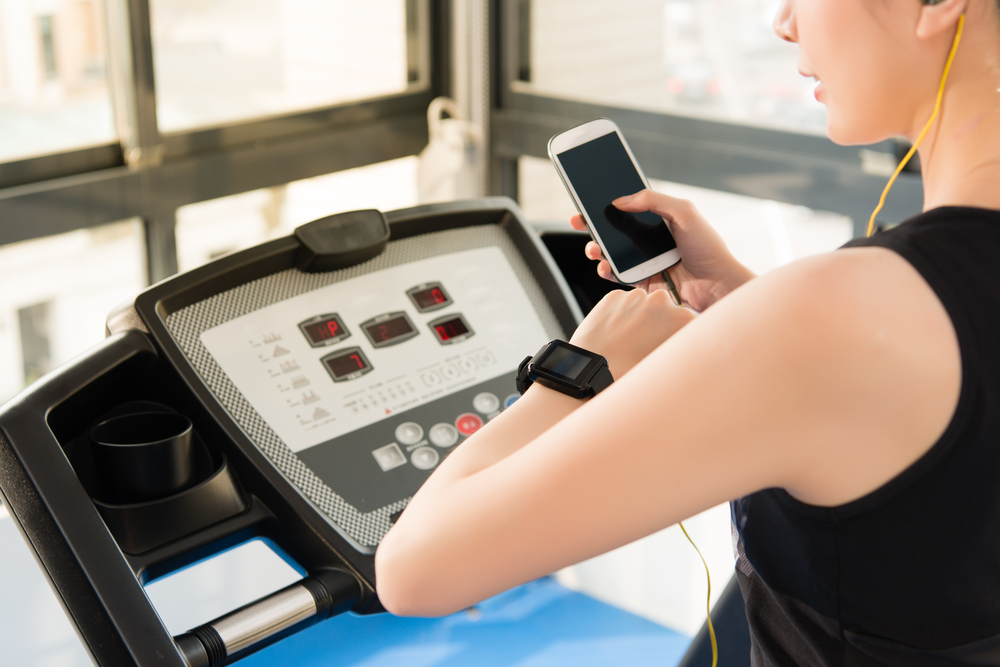Is Your Smartphone Weighing Down Your Workout?
4:28 minutes

Smartphones are becoming our closest gym buddies, counting reps, monitoring heart rate, and enlivening our routines. But a phone can also disrupt a workout. Talking and texting on your cell while walking on a treadmill can reduce your balance by 19 to 45 percent, according to a study in the journal Performance Enhancement and Health. Exercise science professor Michael Rebold, an author on the paper, works out the good and bad of adding your phone to your exercise routine.
Michael Rebold is a program director and assistant professor of Integrative Exercise Science at Hiram College. He’s based in Hiram, Ohio.
IRA FLATOW: And now it’s time to play good thing, bad thing– because every story has a flip side.
Smartphones have changed all aspects of our lives, including how we exercise. Back in the day– I’m talking to the era of jazzercise, water aerobics, remember all of those– finding the right exercise class or a trainer could be a tough thing. But now the perfect workout buddy is right in your pocket or strapped to your arm. All sorts of apps can help with your exercise routine. But how does using your smartphone really affect your training?
My next guest is here to work out– get it?– the good and the bad of hitting the gym with your phone in hand. Michael Rebold is the program director of Integrative Exercise Science at Hiram College in Hiram, Ohio. Welcome to Science Friday.
MICHAEL REBOLD: Hi. Nice to be on.
IRA FLATOW: Now our phones are with us all the time. Sometimes you can’t help but bring it. What are some of the ways our phone can help us, the good thing while we’re working out?
MICHAEL REBOLD: All right, so first off, we know that using our cell phone for listening to music increases our exercise intensity. So if we exercise and exercise at a higher intensity, we’re going to have a higher caloric expenditure. So that’s one benefit of using our cell phone while working out– is listening to music with it. And then also music kind of drowns out our heavy respiration, sweating that’s associated with exercise, allowing us to somewhat enjoy exercise more and exercise for longer durations as well. so also leading to greater caloric expenditure.
IRA FLATOW: So you know– I recognize that. I have good music, you know. I know I get a good beat going.
MICHAEL REBOLD: As long as you have a good tempo, it’s going to increase that exercise intensity.
IRA FLATOW: Mm-hmm. Now you looked at specifically how texting and talking can trip you up on a treadmill. What did you find that was not very good news, was it?
MICHAEL REBOLD: Two common things that we used our cell phone for are texting and talking. So while utilizing your cell phone for those two purposes, we found in one study that it does decrease your exercise intensity, but in a more recent study we found out that it does also decrease your balance. So if you use your cell phone for texting while working out, it’s going to decrease your balance up to 45%, and then if you use it for talking, 19%. Both are significant because if we do decrease our balance while exercising, this can increase our risk for injuries and obviously not a good thing– it can lead to knee sprains, ankle sprains, more significant injuries, those types of things. So texting, talking while using the cell phone, really distracts us from exercising and predisposes us to significant injuries possibly.
IRA FLATOW: If it’s almost 50-50, and you’re balancing, the next thing you’re going to fall off that machine.
MICHAEL REBOLD: Yup, exactly. With the cell phone, we’re so in tune with it, so if we get a text or if we’re talking with someone, we’re more interested in that conversation and not that exercise bout that’s going on. So we shift our attention to the cell phone, and we forget what we’re doing. So we could possibly if we’re on the treadmill, fall off of the treadmill and hurt ourselves.
IRA FLATOW: It just takes some fraction of a second. [LAUGHTER]
MICHAEL REBOLD: Yeah, it just takes a half a second, and there you go.
IRA FLATOW: You’re gone. We know, of course, that exercise is part physical and it is part mental. Do you know how using our smartphones affects the cognitive benefits?
MICHAEL REBOLD: So I just recently completed a study looking at cell phone use– once again texting and talking– and examined how it affected our cognition during an aerobic bout of exercise. So we know engaging in aerobic exercise, we have this release of neurotransmitters like endorphins, increased blood flow to the brain, therefore enhancing our cognition. And preliminary findings from this study found that if you’re going to use your phone while engaging in an aerobic bout of exercise for texting and talking actually blunts these cognitive benefits from actually happening.
IRA FLATOW: All right, well we’ll make sure we’re not texting and talking on that treadmill. Thank you very much, Michael Rebold, program director of Integrative Exercise Science at Hiram College in Hiram, Ohio.
Copyright © 2016 Science Friday Initiative. All rights reserved. Science Friday transcripts are produced on a tight deadline by 3Play Media. Fidelity to the original aired/published audio or video file might vary, and text might be updated or amended in the future. For the authoritative record of ScienceFriday’s programming, please visit the original aired/published recording. For terms of use and more information, visit our policies pages at http://www.sciencefriday.com/about/policies/
Alexa Lim was a senior producer for Science Friday. Her favorite stories involve space, sound, and strange animal discoveries.